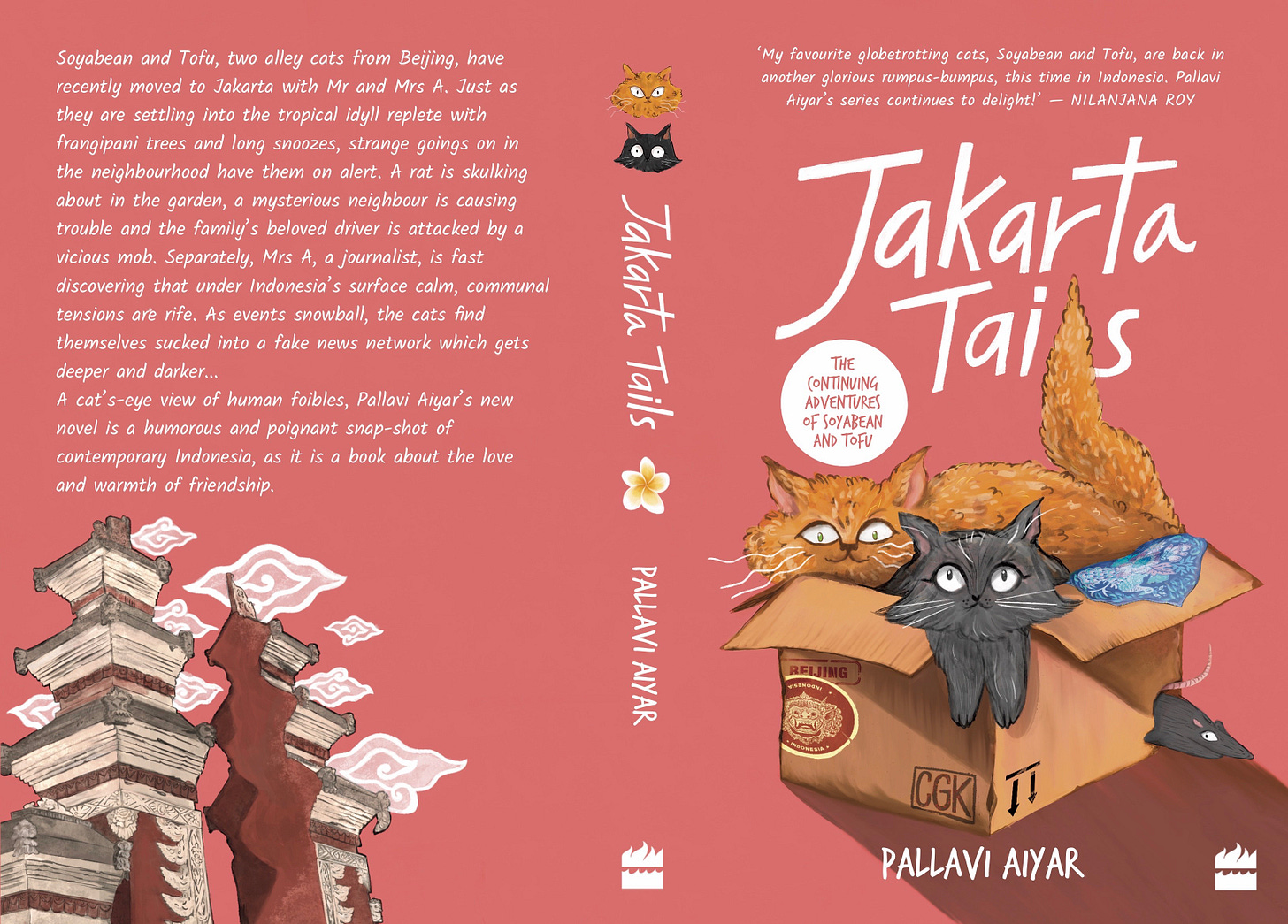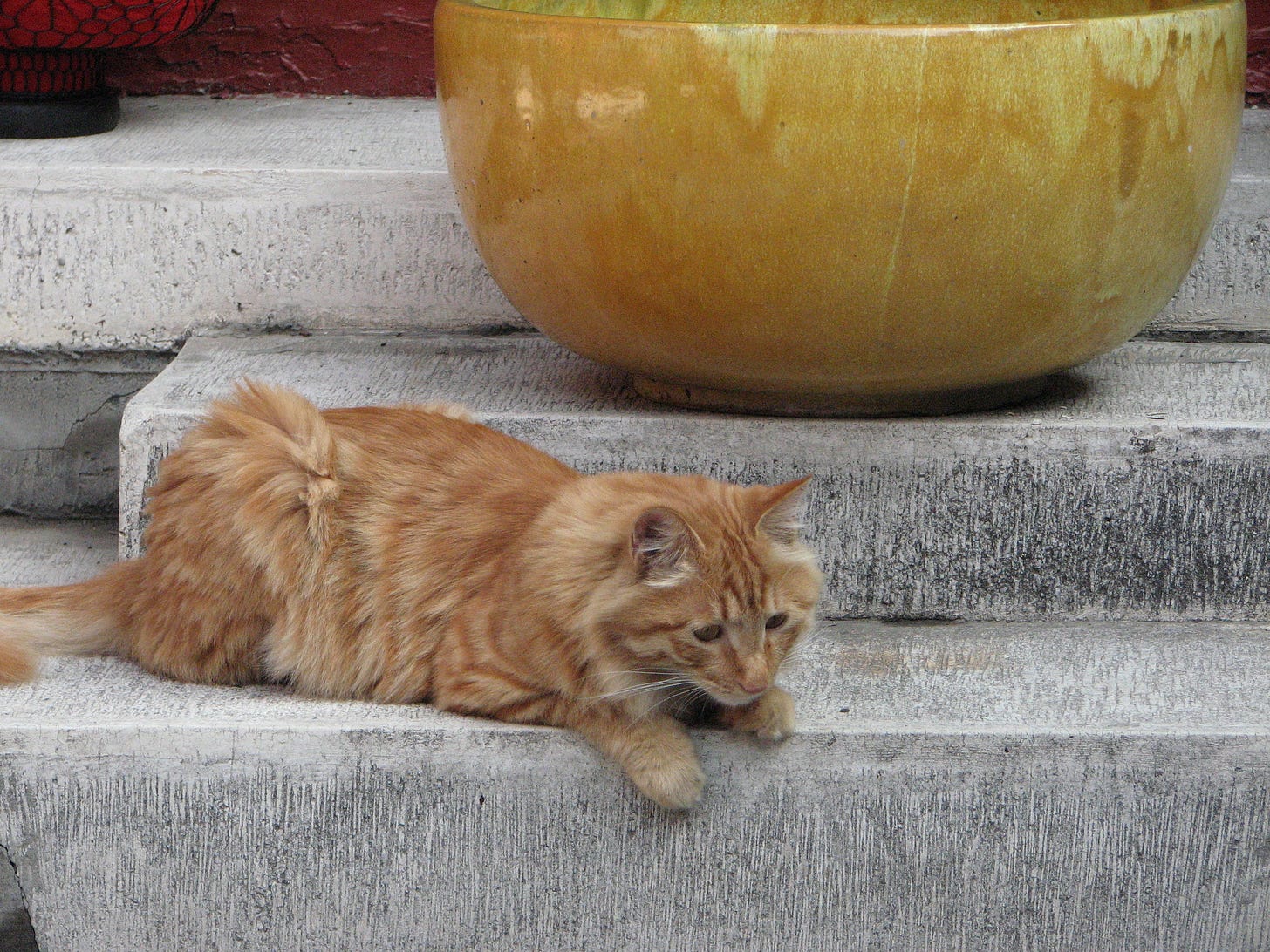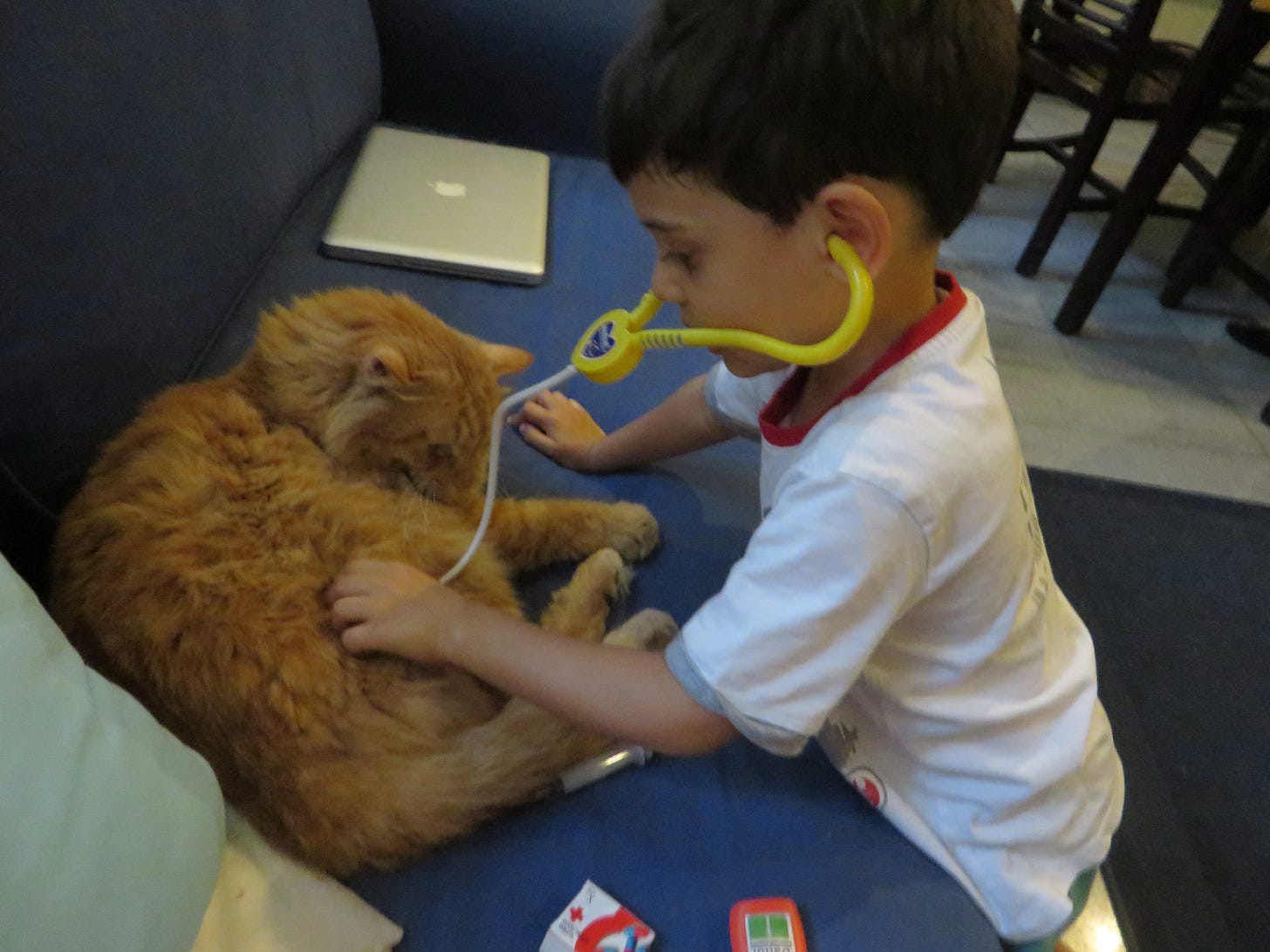Hello Global Jigsawers,
The summer holidays are approaching. I’m expecting a visit from my brother next month, the first visitor from abroad I’d have had in a year and a half. I feel like a little girl on the eve of Diwali, or one who’s been promised a longed-for pet by her parents.
Which brings me to this week’s post, about my cats.
I am mother to what are possibly the world’s best travelled cats. Caramel and Tofu have been part of the Arias-Aiyar household since 2006, preceding the birth of our older son by two years. They have lived in five countries, are at home in airplanes, like their steak rare, and have had two novels written about their imagined adventures.
One, Chinese Whiskers, is about them fighting corruption in China, the other, Jakarta Tails, has them taking on a fake news network in Indonesia.
In short, they are the cat’s whiskers. A Belgian teenager once made a board game featuring these fine felines for a school project. They’ve attended book club zoom calls. And I’m regularly queried about their pedigree, so fine is their countenance. In fact, their aristocatic bearing bellies their humble origins.
My husband and I decided to adopt a pair of cats as preparation for parenthood. By the summer of 2006, we’d been together for several years, and begun contemplating offspring - something everyone else seemed to think was a good idea - but felt like a formidable responsibility to us.
Since we lived in China at the time, we decided to go about the whole business in a quintessentially Chinese way: the pilot project. Ever since the days when Mao Zedong was supreme leader of the People’s Republic of China, but even more so after the wily Deng Xiaoping took over the reins, the Chinese had proceeded with economic reforms by testing the waters of any policy in a small, controlled manner, before launching it nationwide.
The best-known example of a pilot scheme were China’s special economic zones, used as early-stage troubleshooters to test regulations before opening to the global economy. The cats were to our plans of birthing little humans, what the SEZs were to China’s economic renaissance.
Moreover, cats were uniquely good testing grounds for sprogs. We would give them unconditional love, and make huge economic investments in their wellbeing, in return for moodiness, entitlement, and the occasional cuddle when they felt thus inclined.
We set about our task by affixing a notice on the bulletin board at the local vet’s office, asking for leads on kittens in need of homes. A day later we had an elderly lady drop by, clutching a palm-length ginger in her arms.
Her courtyard home, in the old part of the city, was only a few alleys down from us. She told us that her yard was overflowing with cats who came and went and bred and yielded a steady stream of kittens.
“Take him,” she’d said, thrusting the tiny bundle at us. And her eyes glistened with tears. “Treat him well. And if you don’t like him, bring him back to me, please.”
Caramel in our Chinese courtyard home
This lady was reborn as Nai Nai, the kindly grandmother in my novel, Chinese Whiskers, who in the story stands for traditional Chinese morality. I gave her all the best lines:
“The one who doesn’t like to read is no better than the one who cannot read,” Nai Nai said.
Adding, “Don’t you think it’s better to like what you have, than to have what you like?”
Her piece de resistance: “Fill your head rather than your pockets, and you can never be robbed.”
The counterfoil to Nai Nai in the novel, was her imagined grandson, Xiao Xu, who was emblematic of the amoral, get-rich-quick culture, that Nai Nai so abhorred.
I based him (very) loosely on the son of our landlords, a hardworking couple whose foreheads were perpetually lined with worry about the feckless ways of their only child. He was a quintessential, Little Emperor – one of a generation of only children born after China had enforced - it’s now amended - one child policy.
We named our new kitten, Caramel for the colour of his fur, but it proved almost impossible for our Chinese friends to pronounce. Our helper at the time, Li Ayi (also eventually a character in the novel) dubbed him Dou Dou, an affectionate version of soyabean, which is why in the novel Caramel is rechristened Soyabean.
The story of Tofu’s adoption was more complicated. While Caramel had been a semi-domesticated, “middle class” cat, Tofu was part of a litter born in a dustbin on a university campus in North Beijing. We were informed about the litter by a Ms. Wang, a cat-activist whose life mission was to look after strays.
I remember peering into the trash can and seeing a dozen eyes looking back at me, saucer-round, and filled with fear. I picked out Tofu, the lord knows why, instinct or fate – what the Chinese call, yunqi - and she became ours.
She was severely emaciated and infected with a host of viruses. The next few days were hell for her, as she was washed and injected and handled by humans. She would bare her teeth at me, when I tried to approach her, but she was so tiny her teeth hadn’t come out yet. It broke my heart and left me felled with an emotion I later identified as maternal love.
Caramel, Tofu, and Li Ayi at our courtyard home in Beijing
In Chinese Whiskers, Soyabean ends up becoming a cat model for a luxury pet food venture that is floated by the unsavory Xiao Xu. Initially flattered by the attention, the cat is horrified to discover later on that the food he’s advertising has been deliberately contaminated with the chemical melamine, to artificially boost its protein content.
In the meantime, a mysterious coronavirus is spreading across the city and sickening people, many of whom blame cats as the source of the virus. Little Tofu ends up kidnapped by a gang of vigilante catnappers intent of ridding the city of the infection, via the mass murder of felines.
Eventually, Tofu escapes and spends time with a group of construction workers, who live in shacks next to the Olympic Games stadium. Here she learns all about the difference between fat cat-humans, and those on the back of whose labour the former enrich themselves.
The novel, in short, wrote itself. For it was the story of China in the first decade of the twenty first century, distilled and given a cat’s eye view. Corruption, contaminated food, growing economic inequity, health scares, and a changing, Olympic Games-worthy cityscape, were one part of the story.
The other part was about the human need to care for animals even under a system that had for so long denounced such feelings as bourgeois and therefore, reactionary.
Fighting for the rights of animals in China could take on shades of political dissent. But despite the risks, the country was filled with pet lovers who fed their dogs and cats the choicest morsels, even if it meant depriving themselves.
In next week’s post I will continue the story of the real-life adventures of Caramel and Tofu, as they gained European affectations in Brussels, exposed corruption in the Indonesian bureaucracy and lost some teeth in Japan.
Nico playing “doctor doctor” with Caramel as the patient. In Jakarta
In the meantime, do share this story, and if possible, switch to a paid subscription to the Global Jigasw. It’s only 5 bucks a month, and will really help me with keeping the writing going. You are all potential patrons of Pallavi – and the alliteration aside, you would be helping a writer remain independent, solvent and creative. My salaams in advance!
Until next week,
xo
Pallavi
PS: Do share your pet stories in the comments section









Aha! So Swami was my first baby, named after Swami from Malgudi Days. He, quite literally, was the love of my life and the first creature to unconditionally love and accept me with my panic attacks. We were a very emotionally dysfunctional and attached pair! Chinni came along a couple of years after my first human baby, and we got Rowdy in 2015 when Swami passed on. Not content with just dogs, we decided to add Rukku and Raghu the bunnies to our barn at the same time as Rowdy. We had asked the Rabbit rescue for a boy and girl, hence Rukku and Raghu, but a year later the Vet confirmed they were both girls!! The names have stuck though!! I'm ready now for a host of barnyard pets- goats, horses, pigs, chickens etc, but the spouse has threatened to make me choose between him and the furbabies if I bring any more home. Alas, I need his income!!!